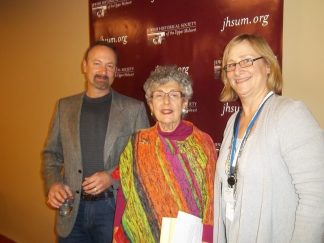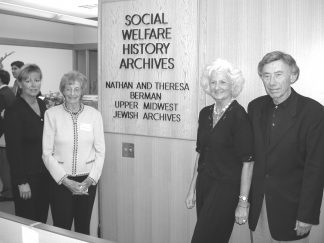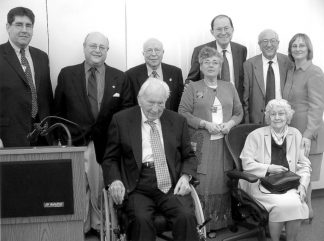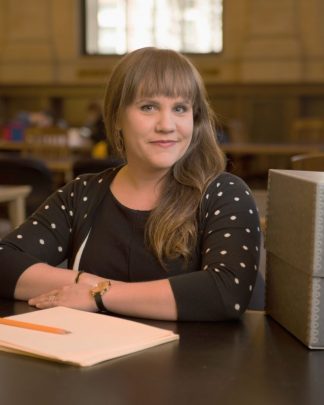By Allison Campbell-Jensen

Jewish Historical Society of the Upper Midwest board president Jamie Heilicher, former director Linda Schloff, and former executive director Katherine Tane.
Close by virtue of their shared roots, the Berman Upper Midwest Jewish Archives and the Jewish Historical Society of the Upper Midwest are sometimes confused by those outside the two organizations. “The archives are collecting the history, and the Historical Society is interpreting and imparting the history,” says Kate Dietrick, Archivist of the Nathan and Theresa Berman Upper Midwest Jewish Archives. “We work together all the time.”
Indeed, Dietrick sits on the board of the Jewish Historical Society of the Upper Midwest and their executive director, Robin Doroshow, is on the archives advisory committee. “The programming that we do is frequently heavily dependent on research from the archives,” Doroshow says. Members of the society may think of them as “our archives,” she adds. Yet they do not have joint staff and the two organizations are not financially tied.
Value of the Upper Midwest Jewish Archives

Jan Berman, Theresa Berman, Sharon Berman Snyder, and Phillip Snyder at an open house event commemorated the Berman’s gift to the University.
In the past, archival collections were created to house the records and lives of people in power, Dietrick says, but that is changing. “Over more recent years, you see a movement to document everyday people’s lives, and to fill in the gaps that are missed,” she says, “and often the gaps relate to minority communities.” The Upper Midwest Jewish Archives focuses on capturing those stories in Minnesota, North and South Dakota, and western Wisconsin.
The archives also collect a different sort of Jewish-American story — different from those of factory workers in New York City’s Lower East Side. And these are Minnesota stories, Dietrick says, because Jewish people were shut out of certain businesses, such as flour milling. So they had to forge their own paths, whether in the cities or in rural North Dakota — and those are the stories collected and preserved by the archives.
The archives hold a “history that we don’t want to lose sight of,” says Sharron Steinfeldt, a founder of the Jewish Historical Society of the Upper Midwest. “It’s important for us to know and that future generations know what life was like.”
Origin of the Archives

Elmer L. Andersen and Eleanor Andersen (seated) at an event to commemorate the Berman’s gift to the University.
The archives have their roots in the society. In 1984, what was then the Minnesota Jewish Historical Society was founded by local community leaders concerned that, with the passage of time, stories and materials were being lost. They began to collect both items and oral histories. By the late 1990s, however, they were running out of space.
Then in 2000, former Gov. Elmer L. Andersen invited the Jewish Historical Society of the Upper Midwest to place a portion of their collection in the Archives and Special Collections at the University Libraries. “[Andersen] had a lofty vision of the archives” that would include every community, says Linda Schloff, former director of the Jewish Historical Society of the Upper Midwest. Nathan and Theresa Berman created an endowment to support the archives.
Over the years, more materials came to the U, and the transfer of the entire collection was completed in 2012. The Jewish Historical Society of the Upper Midwest continues to produce an academic journal — the latest volume was on the history of Jewish theater in Minnesota — and collaborates with Jewish communal organizations and other community groups on historical presentations. They are beginning an oral history project, Doroshow says, remotely interviewing Jewish leaders, rabbis, other clergy, and directors about how COVID affected their professional lives.

Kate Dietrick, Archivist, Upper Midwest Jewish Archives
Along with supporting the archives, the Berman Fund partially funds a half-time archivist position. Since Dietrick came on as archivist in 2013, she has developed a website, created finding aids, and digitized a great many materials, making them available to researchers anywhere. Growing the collection is a top priority of the society, Doroshow says, and they strive to connect donors of potential materials to Dietrick and the archives. Donations from community organizations and synagogues to the archives are in the works, Schloff says.
Those who wish to help the Upper Midwest Jewish Archives grow, and support the archivist stewarding it, may give to the Berman Fund.
Give now!



